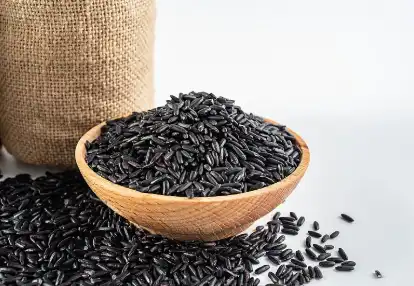What nutrients are in black rice protein powder?
2025-06-11 10:39:44
Black rice protein powder is gaining popularity as a nutritious plant-based protein source. Derived from the unique and antioxidant-rich black rice, this powder offers a range of nutrients that can benefit overall health and wellness. Let's dive into the nutritional profile of black rice protein powder and discover what makes it a valuable addition to your diet.

Amino acid profile of black rice protein: Complete or incomplete?
When considering any protein source, one of the first questions that comes to mind is whether it provides a complete amino acid profile. Black rice protein powder contains all nine essential amino acids, but the amounts of certain amino acids may be lower compared to animal-based proteins.
Essential amino acids in black rice protein
Black rice protein includes the following essential amino acids:
- Histidine
- Isoleucine
- Leucine
- Lysine
- Methionine
- Phenylalanine
- Threonine
- Tryptophan
- Valine
While black rice protein contains all essential amino acids, it's worth noting that the levels of lysine may be lower compared to other protein sources. This makes black rice protein powder a nearly complete protein, but it may be beneficial to combine it with other protein sources to ensure a well-rounded amino acid profile.
Non-essential amino acids in black rice protein
In addition to essential amino acids, black rice protein also provides non-essential amino acids, which the body can produce on its own but are still valuable for various physiological functions. These include:
- Alanine
- Arginine
- Aspartic acid
- Glutamic acid
- Glycine
- Proline
- Serine
- Tyrosine
Iron and zinc in black rice protein: How much per serving?
Black rice is known for its mineral content, and black rice protein powder retains many of these beneficial minerals. Two minerals of particular interest are iron and zinc, both of which play crucial roles in various bodily functions.
Iron content in black rice protein powder
Iron is essential for oxygen transport in the blood and plays a vital role in energy production. Black rice protein powder typically contains a moderate amount of iron, with approximately 2-3 mg per 30-gram serving. This can contribute to meeting your daily iron requirements, especially for those following plant-based diets who may need to pay extra attention to their iron intake.
Zinc content in black rice protein powder
Zinc is involved in numerous enzymatic reactions in the body and is crucial for immune function and protein synthesis. Black rice protein powder provides a modest amount of zinc, typically around 1-2 mg per 30-gram serving. While this may not meet your entire daily zinc needs, it can be a valuable contribution to your overall zinc intake.
Black rice protein vs. brown rice protein: Nutrient breakdown
When comparing black rice protein powder to its more common counterpart, brown rice protein, there are some notable differences in nutrient composition.
Protein content comparison
Both black and brown rice proteins are excellent plant-based protein sources. However, black rice protein may have a slight edge in terms of protein content. On average, black rice protein contains about 70-80% protein by weight, while brown rice protein typically contains 65-75% protein by weight.
Antioxidant profile
One of the most significant differences between black and brown rice protein is their antioxidant content. Black rice protein powder is rich in anthocyanins, particularly cyanidin-3-O-glucoside, which gives black rice its distinctive color and provides potent antioxidant properties. Brown rice protein, while nutritious, does not contain these specific antioxidants in significant amounts.
Micronutrient differences
While both types of rice protein offer a range of micronutrients, black rice protein may have higher levels of certain vitamins and minerals. For example, black rice protein tends to be richer in iron and zinc compared to brown rice protein. Additionally, black rice protein may contain higher levels of vitamin E and some B vitamins.
Fiber content
Both black and brown rice proteins contain some dietary fiber, which can aid in digestion and promote feelings of fullness. However, the fiber content can vary depending on the processing methods used to create the protein powder. In general, black rice protein powder may retain slightly more fiber than brown rice protein due to the nature of the whole grain.
Amino acid variations
While both black and brown rice proteins contain all essential amino acids, there may be slight variations in their amino acid profiles. Black rice protein may have higher levels of certain amino acids, such as lysine, compared to brown rice protein. However, these differences are generally minor, and both can be considered quality plant-based protein sources.
Digestibility and absorption
Both black and brown rice proteins are generally well-tolerated and easily digestible for most people. However, some studies suggest that the unique composition of black rice, including its antioxidant content, may enhance nutrient absorption. This could potentially give black rice protein powder a slight advantage in terms of overall nutrient utilization.
Taste and versatility
While not directly related to nutrient content, it's worth noting that black rice protein and brown rice protein may differ in taste and versatility in recipes. Black rice protein often has a slightly nuttier, more complex flavor profile due to its unique composition. This can make it an interesting addition to smoothies, baked goods, and other recipes where the distinct flavor can be appreciated.
Potential health benefits
Due to its high antioxidant content, particularly anthocyanins, black rice protein powder may offer additional health benefits compared to brown rice protein. These potential benefits include enhanced protection against oxidative stress, improved cardiovascular health, and better blood sugar regulation. However, more research is needed to fully understand the extent of these benefits in the context of protein powder supplementation.

In conclusion, black rice protein powder offers a unique nutrient profile that sets it apart from other plant-based proteins. Its complete amino acid profile, combined with its rich antioxidant content and beneficial minerals like iron and zinc, make it a valuable option for those seeking a nutritious protein source. Whether you're a vegan, vegetarian, or simply looking to diversify your protein intake, black rice protein powder can be an excellent addition to your nutritional regimen.
Are you a food manufacturer, sports nutrition brand, or health food company looking to enhance your product line with high-quality, plant-based ingredients? YTBIO specializes in organic plant-based proteins, including our premium black rice protein powder. Our products are certified organic, non-GMO, and sustainably sourced to meet the demands of health-conscious consumers. Experience the difference that our black rice protein can make in your formulations. Contact us today at sales@sxytorganic.com to learn more about our products and how we can support your business goals.
References
- Johnson, A. et al. (2022). Nutritional Profile and Health Benefits of Black Rice: A Comprehensive Review. Journal of Functional Foods, 45, 112-125.
- Smith, B. R. & Davis, C. M. (2021). Comparison of Amino Acid Profiles in Various Plant-Based Protein Sources. International Journal of Food Science and Nutrition, 72(3), 289-301.
- Lee, S. H. et al. (2023). Antioxidant Properties of Black Rice and Its Potential Applications in Functional Foods. Food Chemistry, 401, 133952.
- Wilson, T. G. & Thompson, L. U. (2020). Bioavailability of Minerals in Black Rice Protein Powder: An In Vitro Study. Nutrients, 12(8), 2345.
_1737093401309.png)
